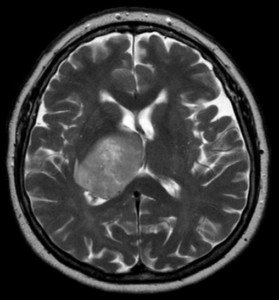
How to stop fearing that your headache means a brain tumor…
Is that throbbing headache making you think you might have a brain tumor?
Many people will fear a brain tumor when they get a sudden, sharp pain in their head, especially if it feels like it’s behind their eye.
A person prone to hypochondria won’t be able to help but think that there is a brain tumor — located behind their eye, perhaps.
Do you fear that every headache means a brain tumor?
“The bottom line is that a headache is highly unlikely to be due to a brain tumor,” says Jonathan Stegall, MD, an integrative oncologist and medical director for The Center for Advanced Medicine, an adult cancer treatment center in Alpharetta, GA.
“It’s important to remember that headaches are quite common, while brain tumors are very uncommon,” though their level of media attention creates the illusion that they’re as prevalent as prostate or breast cancer.
“Virtually everyone has had a headache at some point in their lives,” says Dr. Stegall.
Millions of people every day suffer pain in their head somewhere.
If you work in a large office, you’ve certainly witnessed this: Is it not true that practically every day, several people are complaining of headaches?
And that bottle of aspirin gets passed around like a jar of candy.
- Meanwhile, only five per 100,000 Americans per year will be diagnosed with a tumor that starts in their brain.
- Plus, about two-thirds of brain tumors are actually benign.
“A brain tumor isn’t likely to cause a headache in isolation, nor is it likely to mimic a tension headache or migraine,” says Dr. Stegall.
“Headaches caused by a brain tumor are typically persistent, lasting days or weeks. They frequently get worse over time.
“Some studies have found that they tend to be more painful in the morning, or wake a person from sleep at night.
“Positioning can impact the headache too, for example, when lying flat.”
Bear in mind, though, that a harmless sinus headache can immediately worsen upon lying flat.
“The headache from a brain tumor can also be accompanied by neurological changes such as vision changes, trouble speaking, seizures, confusion and having trouble walking.”
A Benign Mass Can Still Be Deadly
For example, a benign mass on the pituitary gland can result in abnormally high secretion of human growth hormone, which can kill the patient if not treated.
A benign tumor can encroach upon parts of the brain that control vital functions.
This is why it’s so important to see your doctor about any unexplained, persistent and especially worsening symptoms including lack of appetite, increased appetite, dizziness, mental fog and fatigue.
How Brain Tumor Headaches Behave
Ask yourself, as should your doctor, if your headache ever goes away.
A brain tumor headache, due to the mass being there all the time and growing, may never totally go away — and in fact, be non-responsive to painkillers.
A headache that comes and goes — being completely gone at times — is likely related to migraine or tension, such as tension in the muscles about the neck.

Glioblastoma multiforme. Credit: Hellerhoff
A tension type of pain can be quite aggravating, and a migraine type can be very strong and even quite debilitating.
Sometimes these pains tend to gravitate to the back of the eye, and this can be alarming.
But as painful as these can be, they do run their course, and also respond to over the counter painkillers, as well as sometimes just a big glass of water, since dehydration can be a causative factor.
A headache from a brain tumor would typically be ongoing for weeks or months.
And remember, if there are accompanying symptoms such as the ones already mentioned, more urgent medical attention is warranted.
Your headache is very likely from a harmless cause as long as it does not also come with worrisome symptoms, which also include numbness in a limb and sudden hearing loss.
To date, no known dietary risk factors exist for developing a brain tumor.

 Jonathan Stegall, MD,
Jonathan Stegall, MD,







































